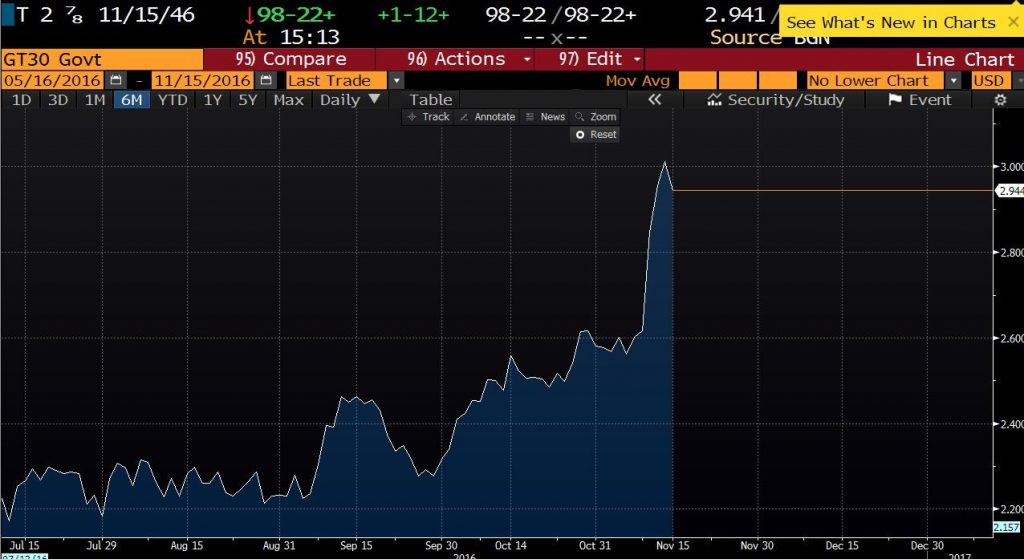Just when you thought it was safe to invest in bonds again, we are seeing bond yields increase globally on the back of Trump winning the US elections. More importantly we believe that we will begin to see very similar changes of government across the EU with French elections around the corner and the Italian referendum occurring in the near-term.
Us rates much higher on back of Trump victory
Are we about to see the breakup of the EU? Maybe but probably not just yet. However, we most certainly will see a much more conservative much more nationalistic series of leaders across Europe, but have a much less consensual and more sovereign pragmatic approach to the EU.
As a result of this growing concern and protectionist nationalistic trend we are beginning to see dislocations in government bond yields in Europe relative to those of Germany, which is considered the anchor/core/safe Haven economy. We think this is a direct result of expectations that right wing, conservative, and nationalistic administrations are voted in across Europe in the coming elections over the next six months.
We believe the market may be beginning to price in the potential breakup of the European Union or at the very least a disharmonious conflicted EU.
The market is definitely pricing in the end of the bond buying program by the European Central Bank in March. Mario Draghi has refused to comment on what his plans are once the current QE program expires in March and we think that the weaker Euro (down 3.7% since the US election) and inflationary pressures in the Eurozone, in Italy, UK, Spain are precisely what the central bank wants to see in order to remain competitive as well as in order to be able to service the high levels of debt in Europe. Remember, the only way that Europe can manage its massive debt burden (Italy 133% of GDP) is through inflation, reducing the absolute cost of debt servicing/principal payments.
Even though the German elections are also coming up Germany seems to be underpinned and seems to be outperforming the other European countries.This is principally due to the fact that if it were to be independent from the greater EU economy Germany as a standalone credit is larger more robust and should trade at a lower yield then all the other European economies. Additionally, the German economy is large enough that if confronted with a fragmented Europe it would benefit from being independent as the vast majority of transfer payments into the EU and the financing of the ECB (over 50%) is borne by Germany. Therefore Germany merits lower longer-term rates due to its enhanced individual credit quality, and its reduced funding costs if Europe were to break up.
Look at the graphs below which shows the spread differential between French 10 year bonds and German 10 year bonds. We expect this to go much further and highly recommend that investors be very cautious of long duration investment-grade and government bond positions going forward. You can clearly see the spread differential widening to recent highs in France vs. Germany as well as the same pattern evident in Italy vs. Germany
French government 10 year spreads vs. Germany 10 year spreads
Italian government 10 year spreads vs. Germany 10 year spreads
Please feel free to contact us with comments or views
Regards
Louis Gargour LNG Capital CIO



